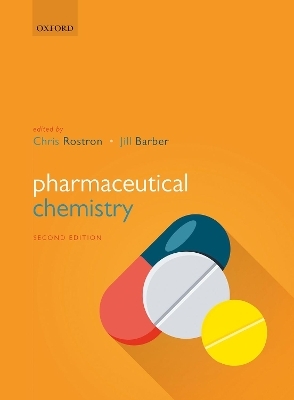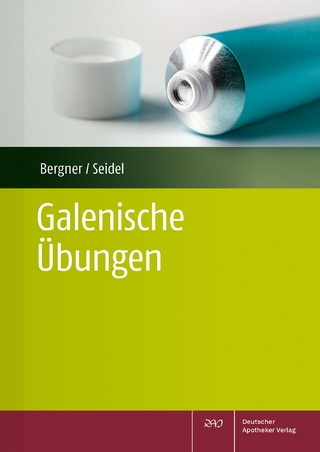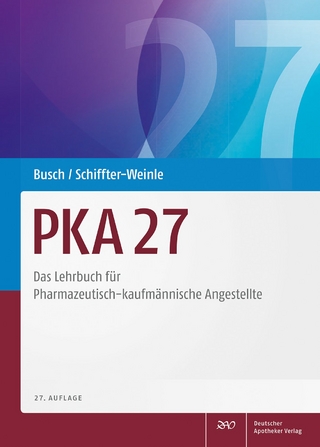
Pharmaceutical Chemistry
Oxford University Press (Verlag)
978-0-19-877978-0 (ISBN)
Pharmaceutical Chemistry provides a wide-ranging overview of organic chemistry as applied to the study and practice of pharmacy. Drugs are simply chemicals, so to fully understand their manufacture, formulation, and the way they work in our bodies, a knowledge of organic compounds and their reactions is essential.
By reading this book, students will begin to understand how a drug molecule is made; the process that turns it into a medicine; the role the pharmacist has when dispensing that medicine; and what happens in the body when it is taken. Most importantly, the text shows how each of these aspects are integrated, helping you to see the bigger picture.
Pharmaceutical Chemistry is available for students and institutions to purchase in a variety of formats, and is supported by online resources.
The ebook offers a mobile experience and convenient access: www.oxfordtextbooks.co.uk/ebooks.
The online resources include:
For students:
- Self-assessment questions to help the reader to check and reinforce understanding of the material introduced in each chapter
- Bonus material to accompany chapters 3, 7 and 11
- Answers to self-check questions from the book
For registered adopters of the book:
- Figures from the book, available to download.
Dr Chris Rostron (editor), graduated in Pharmacy from Manchester University and completed a PhD in Medicinal Chemistry at Aston University. He gained Chartered Chemist status in 1975. He is now an Honorary Research Fellow in the School of Pharmacy and Biomolecular Sciences at Liverpool John Moores University. He was a member of the Academic Pharmacy Group Committee of the Royal Pharmaceutical Society of Great Britain and chairman for 5 years. He was chairman of the Academic Pharmacy Forum and deputy chair of the Education Expert Advisory Panel of the Royal Pharmaceutical Society. He has been an external examiner in Medicinal Chemistry at a number of Schools of Pharmacy both in the UK and abroad. In 2008, he was awarded honorary membership of the Royal Pharmaceutical Society of Great Britain for services to Pharmacy education. Dr Jill Barber (editor), studied Natural Sciences at the University of Cambridge and completed a PhD in Bio-organic Chemistry at the same university in 1980. She then spent five years in some of the oldest universities in Europe, learning Biochemistry, German and Renaissance Music. She settled in Manchester in 1986, with a permanent position in the School of Pharmacy and Pharmaceutical Sciences, where her research focuses on drugs that inhibit protein synthesis and she teaches chemotherapy and its underlying chemistry and biochemistry. She has published several teaching-related research papers about the factors influencing student success.
1: The importance of pharmaceutical chemistry
2: Organic structure and bonding
3: Stereochemistry and drug action
4: Properties of aliphatic hydrocarbons
5: Alcohols, phenols, ethers, organic halogen compounds and amines
6: The carbonyl group and its chemistry
7: Introduction to aromatic chemistry
8: Inorganic chemistry in pharmacy
9: Nucleic acids
10: Proteins and enzymes
11: Carbohydrates and carbohydrate metabolism
12: Lipids
13: Origins of drug molecules
14: Absorption, distribution, metabolism and excretion
| Erscheinungsdatum | 09.03.2021 |
|---|---|
| Verlagsort | Oxford |
| Sprache | englisch |
| Maße | 190 x 245 mm |
| Gewicht | 870 g |
| Themenwelt | Medizin / Pharmazie ► Pflege |
| Medizin / Pharmazie ► Pharmazie ► PTA / PKA | |
| Naturwissenschaften ► Chemie ► Organische Chemie | |
| ISBN-10 | 0-19-877978-X / 019877978X |
| ISBN-13 | 978-0-19-877978-0 / 9780198779780 |
| Zustand | Neuware |
| Informationen gemäß Produktsicherheitsverordnung (GPSR) | |
| Haben Sie eine Frage zum Produkt? |
aus dem Bereich


